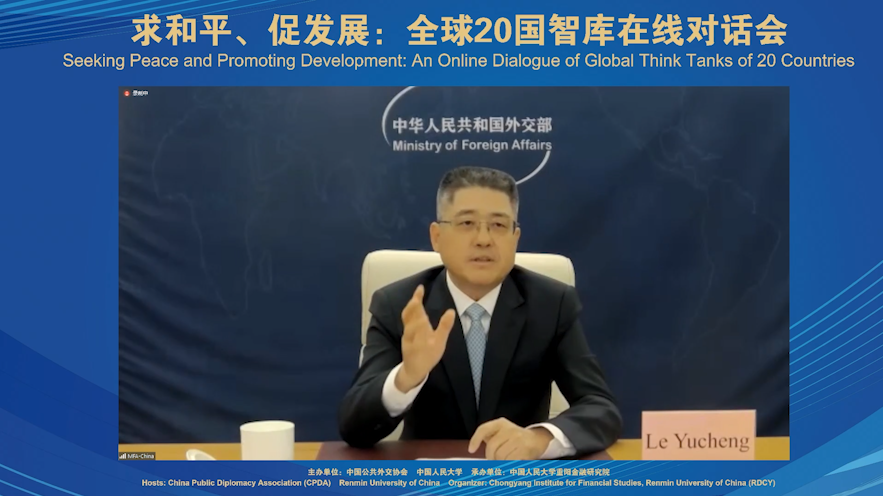
Chinese Vice Foreign Minister Le Yucheng speaks at a think tank panel on Friday. Photo: Screenshot of the panel's livestreaming
Major countries should set an example for others by following the international rules rather than being "exceptions" and the US should learn a lesson from the Russia-Ukraine crisis as it assumes the main responsibility for the security of Europe, Chinese Vice Foreign Minister Le Yucheng told a think tank panel on Friday. There are three major aspects of the lesson - the Cold War mentality should be abandoned, unilateral sanctions have to be dropped and a proxy war should not be launched, he said.
China has been growing into a positive force for world peace and security but some have turned a blind eye toward this positive role, Le said at an online dialogue of global think tanks from 20 countries titled "Seeking Peace and Promoting Development: An Online Dialogue of Global Think Tanks of 20 Countries," which was sponsored by the China Public Diplomacy Association (CPDA) and Renmin University of China.
"Concerning the Russia-Ukraine crisis, there have been a number of absurd claims and misinformation, trying to shift the blame of the crisis to China by citing the most recent China-Russia joint statement," Le said.
For example, as there's no limit for China-Russia friendship and no forbidden areas of cooperation, some assumed that China knew of Russia's military operation in advance and suggested that China should take responsibility for the conflict. "Such claims are absurd," the Chinese official said.
China is neither the relevant party nor the party that caused the current situation, so why should it take the responsibility? Le asked. "The China-Russia relationship is non-aligned, non-confrontational and not targeted at any third party, and such friendship with no upper limits and cooperation with no forbidden areas showcases the reality and prospects for the bilateral ties," he said.
But certain countries put limits on their relationship with China, defining the bilateral ties as competition and confrontation and limiting bilateral cooperation. "How could such a bilateral relationship develop well?" Le asked.
Since the Russia-Ukraine crisis, China has adhered to the UN Charter and the principle of indivisible security, making efforts to promote peace and negotiation and actively participating in humanitarian assistance without making calculations or seeking private gain, Le said.
But some major powers have not encouraged peace talks and even threatened to use the Ukraine crisis to weaken Russia.
"What they care about is neither the peace talks nor the safety of the Ukrainian people. They regard Ukraine as a consumable material and cannon fodder to bring down Russia, and use the lives of Ukrainians to satisfy their own great power ambitions and achieve their own geostrategic goals," he said.
Some US officials claimed that the Ukraine-Russia crisis is a reminder that the US should not ignore China, and the US needs to win two battles in both Europe and Asia, which are very dangerous claims, Le noted. The US has not learned the lessons from war-torn Europe and seeks to expand the battlefield to Asia by advancing its so-called Indo-Pacific strategy, which will only lead to severe consequences and bring trouble for Asia.
"Isn't it the Asian version of NATO expansion?" he asked, noting that such ill-intentioned attempts of copying the Ukraine crisis in Asia are doomed to fail.
With the Russia-Ukraine crisis, the US allows suffering in Europe while it earns huge profits from the war, as both its military-industrial complex and energy sector record growing sales. At the same time, it only accepts a few dozen refugees. This might explain why they hope to "add fuel to the fire" and hinder the negotiations between Russia and Ukraine, the Chinese official said, noting that the US purpose is obvious: sacrifice Ukraine to control Europe, weaken Russia and extend its hegemony.
"The Ukraine crisis has exposed severe problems in global governance, particularly in Europe where there's so-called good governance," he said, noting that it showed that some countries' security strategies have failed and their mindsets are behind the times.
Some US lawmakers reportedly compared the Ukraine crisis with the Taiwan question, as some claimed that the Chinese mainland should learn "lessons" from the crisis given the US-led sanctions imposed on Russia. Le refuted such claims and pointed out two mistakes.
Firstly, there is no comparison between the Taiwan question and the Ukraine issue, Le said. The one-China principle is a consensus of the international community, Taiwan is an inalienable part of China, and the Taiwan question is part of China's internal affairs, he said.
Some people emphasize respect for the sovereignty and integrity of one country on the issue of Ukraine, but they openly step on the red line of the one-China principle on the Taiwan question. This is a "double standard" and an abuse of international rules.
Also, it is not China but the US that should learn a lesson from the Ukraine crisis, Le said, noting that the US should learn that the Cold War mentality has to be abandoned, the unilateral sanctions have to be scrapped and a proxy war should not be launched.
At the panel, Le made four suggestions for the current global security situation, including insisting on upholding international law and opposing tampering with the law by using domestic laws and regulations. Also, countries must adhere to the principle of indivisibility of security and not sacrifice the security of other countries to pursue their own security.
The international community has to uphold unity and oppose bloc-based political and ideological confrontation while insisting on opposing unilateral sanctions and safeguarding security and stability in the Asia-Pacific, Le said.



